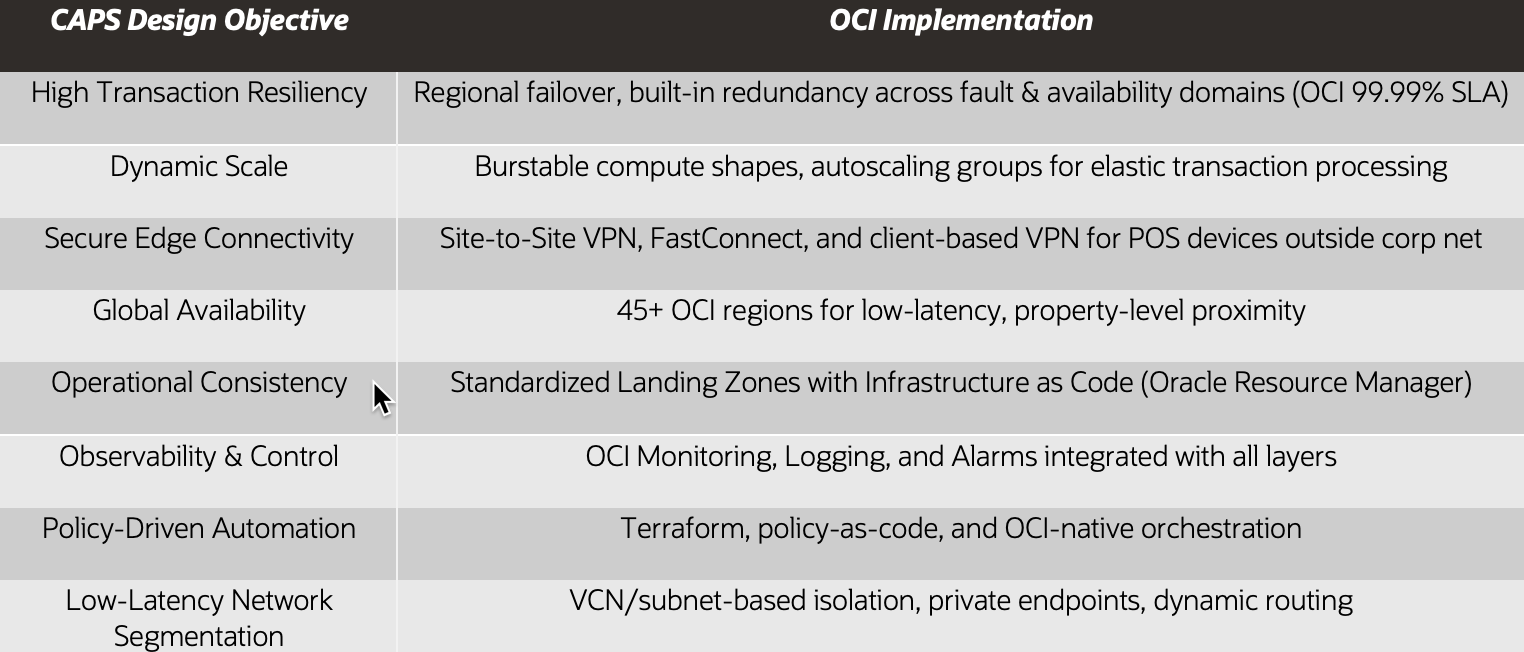Peak Transaction Resiliency in High-Volume, Complex Networking Environments with Oracle Cloud Infrastructure
Oracle Simphony is a cloud-based Point-of-Sale (POS) platform built for the high-transaction demands of the restaurant, sports and entertainment and hospitality industries. The platform is architected to ensure the highest levels of reliability, even in the most challenging environments. This is mission critical for operators that have a finite window to trade, like stadiums, or are operating within a complex networking environment, as is the case in airports.
The Simphony Check and Posting Service (CAPS) is a built-in resiliency feature of the Simphony architecture, designed to keep transaction sharing services continuously available. For example, if an ISP or WAN outage occurs, CAPS seamlessly stores transactions locally and automatically syncs them once connectivity is restored. CAPS effectively maintains transaction integrity and real-time connectivity to above store applications across hundreds of POS endpoints, even during peak operational surges. Operators that conduct most of their trade in an exceptionally finite windows (i.e., professional sports half-time) deployments have traditionally been on property-specific infrastructure.
However, as organizations increase their digital footprint, extend their operations pre- and post-event to drive incremental revenue opportunities and seek to minimize capital costs, there is an increased interest in moving all mission-critical services to the cloud. Oracle Cloud Infrastructure (OCI) offers a high-performance, enterprise-grade cloud platform engineered to support mission-critical hospitality workloads. With built-in high availability, horizontal scalability, and secure network isolation, OCI delivers the underlying infrastructure needed to operate services like CAPS reliably across a distributed portfolio of properties—and eliminates the operational overhead of local infrastructure.
In this blog, we will explore the strategic benefits of moving CAPS to OCI and dive into the services that enable high availability and flexibility. We’ll also discuss real-world scenarios illustrating OCI’s agility – from handling stadium event surges to enabling hotel chains to run simultaneous promotions. Finally, we highlight key OCI services (like Terraform automation, Monitoring/Logging, and Autoscaling) that empower hospitality IT teams to manage CAPS deployments more effectively.

Designing CAPS for Resiliency and Scale on Oracle Cloud Infrastructure:
CAPS must support real-time, high-volume transactions without failure, whether during major stadium events or across thousands of hotels worldwide. Oracle Cloud Infrastructure (OCI) offers a secure, automated foundation designed to handle these requirements with built-in high availability, intelligent network segmentation, and dynamic compute scale-out.
Key design elements enabled by OCI include:
- Landing Zone with Infrastructure as Code (IaC): Automatically provision secure, scalable environments for CAPS using Oracle Resource Manager and predefined cloud guardrails.
- Secure Network Design: Isolate CAPS within Virtual Cloud Networks (VCNs), leveraging subnets, route tables, and encrypted VPN or FastConnect paths to ensure low-latency POS communication.
- Adaptive Compute: CAPS runs on customizable VM shapes that adjust to traffic needs, using burstable or autoscaling compute pools without overprovisioning.

Designing CAPS for Resiliency and Scale on Oracle Cloud Infrastructure:
CAPS must support real-time, high-volume transactions without failure, whether during major stadium events or across thousands of hotels worldwide. Oracle Cloud Infrastructure (OCI) offers a secure, automated foundation designed to handle these requirements with built-in high availability, intelligent network segmentation, and dynamic compute scale-out.
Key design elements enabled by OCI include:
- Landing Zone with Infrastructure as Code (IaC): Automatically provision secure, scalable environments for CAPS using Oracle Resource Manager and predefined cloud guardrails.
- Secure Network Design: Isolate CAPS within Virtual Cloud Networks (VCNs), leveraging subnets, route tables, and encrypted VPN or FastConnect paths to ensure low-latency POS communication.
- Adaptive Compute: CAPS runs on customizable VM shapes that adjust to traffic needs, using burstable or autoscaling compute pools without overprovisioning.
Accelerated Innovation
Migrating CAPS to OCI enables IT teams to focus on strategic initiatives rather than infrastructure management. Native integration with analytics, artificial intelligence, and data services allows organizations to extract insights from transaction data, improve guest personalization, and connect with partners more efficiently.
Standardization and Global Reach
OCI supports consistent deployment and configuration of CAPS across multiple properties and regions. With over 100 cloud regions worldwide, organizations can maintain proximity to the point of service while ensuring policy consistency, centralized management, and rapid global rollouts.
Conclusion
Check and Posting Service (CAPS) on Oracle Cloud Infrastructure (OCI) enhances the operational and strategic value of restaurant systems—especially across sports, entertainment, and travel venues. By leveraging OCI’s enterprise-grade infrastructure for automation, observability, network security, and distributed cloud regions, food service organizations can further optimize performance, streamline management, and deliver consistent, high-quality guest experiences across locations.
Call to Action
Ready to explore how OCI can streamline your IT infrastructure and operations?
Get started with an OCI Free Trial tenancy today to test your CAPS deployment in the cloud and experience the benefits firsthand. The future of hospitality POS starts now—explore what’s possible with OCI.
Resources

